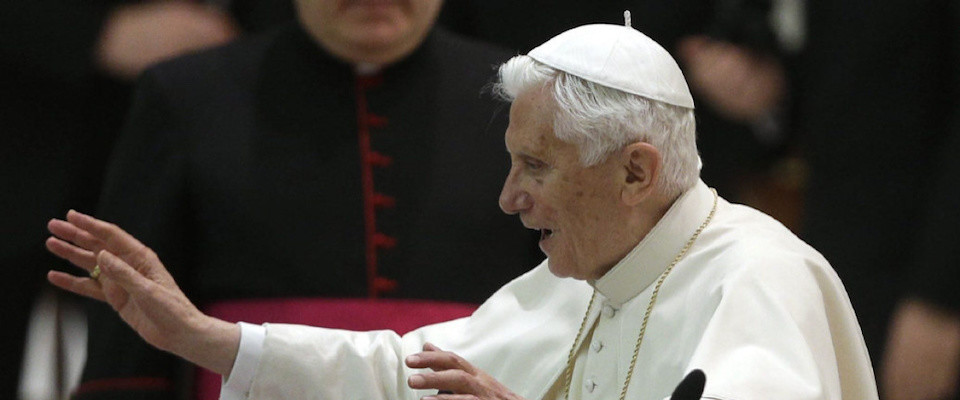Benedict and His Critics, by Cardinal Gerhard Ludwig Müller

CNA: Cardinal Müller, To Renew the Church We Must Be Guided by Her Faith, Morals
April 30, 2019
LIFENEWS: Louisiana House Passes Constitutional Amendment Confirming There’s No Right to Abortion
April 30, 2019
By Gerhard Ludwig Müller, First Things, 4 . 26 . 19
Pope Francis is happy with Benedict XVI’s profound analysis of the reasons behind the abuse crisis in the Church, and grateful to his predecessor for pointing out the conclusions those in positions of responsibility must draw. Benedict XVI has rich experience with these issues: from his ministry as a priest (since 1953), as a theology professor (1957), as a bishop (1976), as Prefect of the Congregation for the Doctrine of the Faith under Pope John Paul II (1981–2005), and as pope (2005–2013).
In the Church, the crucial instrument against sexual abuse is the Motu proprio Sacramentorum sanctitatis tutela (2001). This law goes back to John Paul II and Joseph Ratzinger, proving that Benedict was and is the most important figure in the Church’s fight against this crisis. He has the widest view of and deepest insight into this problem, its causes and history. He is in a better position than all the blind who want to lead other blind people—not the truly blind on whom Jesus has mercy, but those he warns against because they see and yet do not want to see (cf. Lk 6:39; Mt 13.13).
At age 92, Benedict XVI is capable of deeper theological reflection than his critics, who lack respect and are ideologically blinded. He is able to get closer to the source of the fire that has set the Church’s roof ablaze. The catastrophic fire in Paris, in one of Christendom’s most venerable houses of God, also has a symbolic meaning: It makes us appreciate again the work of good firefighters, instead of blaming them for the water damage done in the course of extinguishing the flames. Rebuilding and renewing the whole Church can only succeed in Christ—if we get our bearings by the Church’s teaching on faith and morals.
The recent assembly of the heads of episcopal conferences in Rome (February 21–24, 2019) should have signaled the beginning of getting to the roots of the evil of abuse. Only if we get to these roots can the Church in Jesus regain credibility as the sacrament of redemption for the world, and again communicate the faith that brings salvation which unites us to God. Unfortunately, the practical conclusions drawn from this assembly have not yet been made public, so the U.S. Bishops’ Conference cannot yet put its suspended measures into practice.
Reports about the experiences of victims who have suffered abuse from consecrated persons have shaken the assembly’s participants. But the generalized and noncommittal analyses by some of the official speakers were also distressing. This certainly was a consequence of the assembly not allowing some of the most competent cardinals to speak—like Cardinal Seán O’Malley, President of the Pontifical Commission for the Protection of Minors, or Cardinal Luis Ladaria, Prefect of the Congregation for the Doctrine of the Faith.
Each canonical process in cases of grave sexual delicts consists of hundreds of pages of source material. This produces empirical knowledge about patterns of action, which allows conclusions to be drawn about the profile of the perpetrators and about typical circumstances. Conversely, to explain the phenomenon as “clericalism” or “sexual pressure caused by celibacy unloading on children,” as connected to the “hierarchical constitution of the Church” and the “sacredness of the priesthood,” is to use buzzwords, prefabricated templates originating in a horizon narrowed by ideology. Such explanations undermine zero tolerance as the only correct policy. Sexual abuse of adolescents or even adult seminarians cannot be tolerated under any circumstances, even if the perpetrator wants to excuse himself by pointing to mutual consent between adults. Only a strict observance of ecclesiastical discipline and tough penalties can deter potential perpetrators and give the victim the feeling that justice has been restored.
The accusation of “clericalism” can easily be leveled against others, but ironically many of those who use it to attack others are liable to it themselves: Whoever as a bishop demands that his clerics are to distribute Holy Communion to persons not in full communion with the faith of the Church, or to those who need to be absolved from grave sin through penance before they can approach communion, is himself hyper-clericalist. He abuses the authority conferred on him by Christ in order to force others to act against Christ’s commandments, even by threatening ecclesial penalties. In such cases, the apostolic rule—“we must obey God rather than men”—applies also in the Church (Acts 5:29, cf. the 1875 declaration of the German bishops against Prussia intruding into Church matters, DH 3115).
All smart but vain attempts of making individual crimes dependent on general dispositions lack empirical basis: Crimes in no way originate in the Church’s sacramental structure, but contradict it. All those who assert this only reveal their own incapacity and unwillingness to honestly discuss Benedict’s contribution and proposals for this explosive topic. Some ideologues have put their own weak morality and intellect on display, and have even been allowed to pour out their hatred and scorn on a platformfinanced by the German Bishops’ Conference. Against their will, such authors offer more proof for Benedict’s diagnosis that a type of moral theology, which for a long time has not been Catholic, has collapsed.
The most infamous accusation is the claim that Benedict would obstruct Pope Francis’s fight against abuse—although Francis is not doing, and cannot do, anything but continue the measures adopted by his predecessor, and protect himself and the Congregation for the Doctrine of the Faith against the pernicious attempts of all those who want to play down and cover up. Benedict, who is telling the truth, is not contributing to a schism—but all those who repress the truth and hide behind psycho-social verbiage are. Whoever, on the backs of young victims of sexual crimes, tries to substitute the Church’s moral teaching, grounded in natural law and divine revelation, with a self-made sexual morality according to the egotistical pleasure principle from the 1970s, not only creates heresy and schism, but is openly abetting apostasy.
Violations of God’s commandments have always occurred. But the series of sexual crimes between 1960 and 1980, committed by priests who through ordination teach, govern as shepherds, and sanctify the faithful in the person of Christ (Vatican II, Presbyterorum ordinis 2), is particularly grave. Such misdeeds, over and above the hurt caused by sexual crimes, profoundly damage the credibility of the whole Church and endanger the victims’ faith in God and their natural trust in Christ’s ministers. A large number of these criminals did not have a sense of guilt, and did not know or directly rejected the teaching according to which sexual acts with adolescents, or with adult persons outside marriage, are morally reprehensible. Who deformed their conscience to such a degree that they no longer knew what the serious sins are by which “neither fornicators, nor idolaters, nor adulterers, nor effeminate, nor homosexuals … will inherit the kingdom of God” (1 Cor 6:9)?
The scandal reaches its pinnacle when the blame is not laid upon those breaking God’s commandments, but instead the commandments themselves are made responsible for their transgression: The cause of sin becomes God, who is allegedly overtaxing us. Naturally, no one puts it directly like that; instead, the Church is accused of interpreting God’s commandments in an outdated fashion. Therefore, it is said, we now need to invent (or, as the euphemistic language puts it, “develop further,” meaning “falsify”) a new sexual morality that agrees with the findings of modern human sciences, which morality “philanthropically” leaves untouched the factual reality of people’s lives. In making such proposals, what is otherwise readily admitted is conveniently forgotten: Namely, that “objective” empirical science without any presuppositions does not exist, and that the underlying anthropology always influences how research data are interpreted. Morality is about distinguishing good and evil. Can adultery be good only because a de-Christianized society thinks about it differently than the Sixth Commandment puts it?
When Paul says that as a consequence of denying the creator and of the sinners’ disdain for God, “men abandoned the natural function of the woman and burned in their desire toward one another, men with men committing indecent acts” (Rom 1:27), he means what he is evidently talking about. How do exegetes know that behind the obvious meaning of these words, something else, even the total opposite, is intended? In immoral acts, especially against matrimonial love and its fecundity, Paul detects a denial of God, because the will of the creator is not recognized as the measure of our doing good. For the life of the Church, this has another important consequence: We can only admit to ordination candidates who also possess the natural prerequisites, are intellectually and morally capable, and show the spiritual readiness to give themselves totally to the service of the Lord.
As Benedict XVI rightly underlines, we can only turn away from false ways if we understand male and female sexuality as God’s gift, which does not serve narcissistic pleasure but has its true goal in the love between spouses and the responsibility for a family. Only in the wider context of Eros and Agape does sexuality have the power to build up the human person, the Church, and the state. Otherwise it brings about destruction. Only a materialist and atheistic point of view sees the voluntary renunciation of marriage in priestly celibacy and in religious life as causing sexual crimes against adolescents. There is no proof for that; statistical data about sexual abuse say the opposite.
The atheistic point of view comes out also in the arguments of those who blame abuse crimes on an invented “clericalism” or on the sacramental structure of the Church. In theological terminology, “clergy” comes from the “share in ministry” (Acts 1:17) which Matthias received when he was elected to the apostolic office, which as a servant of the Word (Lk 1:2; Acts 6:4) he was to exercise in “episcopacy” (Acts 1:20) and as “shepherd” (1 Peter 5:2). Bishops and priests are not ordained as “officials” (with stable salary and state pension), but as ministers of Christ in preaching, as administrators of mysteries in the divine liturgy and the sacraments, and for service with the Good Shepherd who gives his life for the sheep. There is a deep unity among the clergy and all the baptized in the common mission of the Church. The lay faithful should not see the clergy as power-fixated functionaries whom they envy for “clerical privileges” that they want to claim for themselves.
Such thinking is possible only in a secularized Church, which is certainly doomed to perdition in any country where such ideology comes to dominate. Instead of surrounding ourselves with media consultants, and seeking help for the Church’s future from economic advisers, all of us—clergy, religious, and lay faithful, especially married people—have to refocus on the origin and center of our faith: the triune God, the incarnation of Christ, the outpouring of the Holy Spirit, the closeness to God in the Holy Eucharist and in frequent Confession, daily prayer, and the readiness to be guided in our moral life by God’s grace. Nothing else provides the way out of the present crisis of faith and morals into a good future.
Translated from the German by Msgr. Hans Feichtinger.
Gerhard Ludwig Cardinal Müller is former prefect of the Congregation for the Doctrine of the Faith.
https://www.firstthings.com/web-exclusives/2019/04/benedict-and-his-critics




